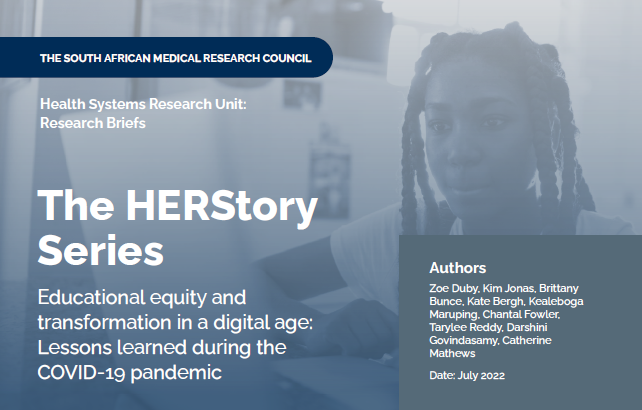The HERStory Series: Educational equity and transformation in a digital age: Lessons learned during the COVID-19 pandemic

The HERStory Series: Educational equity and transformation in a digital age: Lessons learned during the COVID-19 pandemic
Summary
- The vast majority of school-age children in South Africa have experienced severe interruptions in their education due to multiple deprivations including food and income insecurity, challenging home environments, and lack of access to appropriate technology and internet connection.
- The closure of schools and tertiary institutions during the COVID-19 pandemic has disproportionately impacted the most vulnerable and marginalised children, adolescents and young people, worsening existing disparities and educational inequity within the South African education system.
- Despite efforts by the South African government to provide accessible online learning resources during the period of school closures, through zero-rated applications, and mobile network operators reducing data costs, poor network connectivity and lack of access to personal internet enabled devices, continued to be a challenge for learners from poor families, and those in rural areas or under resourced communities.
- The development of appropriate, gender-sensitive policies and programmes is needed to ensure equity in education.
- On-going and routine digital learning strategies need to include efforts to improve technological skills and digital literacy amongst both learners and teachers.
- Efforts are needed to address structural drivers of school dropout and the ‘digital divide’.
View the complete Research Brief: Educational equity and transformation in a digital age: Lessons learned during the COVID-19 pandemic
|
The South African Medical Research Council’s strategic plan includes the generation of new knowledge and its translation into policy and practice. In the Health Systems Research Unit, our research aims to inform and support decision-making in health and social policy to strengthen health systems, and therefore improve the health of South Africans. We evaluate the effectiveness and efficiency of care delivery models in communities, schools, and health facilities. To ensure relevance of our research, we apply implementation science principles and approaches, and engage and partner with Departments of Health at all levels of government, as well as with communities and other stakeholders. As a unit, we are developing research briefs based on manuscripts that have been published. Our intention is to disseminate key research findings to a broad audience, sharing the research briefs on multiple platforms to ensure wide reach, and work towards bridging the divide between academic research and the development of policy and practice. We aim to use these research briefs as a tool to summarise the key findings of recent studies, outline the implications for policy and practice in the South African context, and provide empirically based, practical, actionable information for policy makers, programme designers and implementers, practitioners, citizens and communities. |
